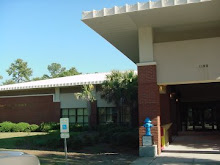Thursday, November 1, 2007
Final Frontier
This has been a very interesting process. I know I'm not going to use everything that I learned about in this Tech Trek, but I feel I am now familiar with more aspects of technology than when I started. Some of this can be used for fun, others may have applications for a more exciting, informative and even interactive web presence for the library.
Wednesday, October 31, 2007
Quest 12B - Pod Cast

I explored the directory provided by podcast.net and found a wide variety available, ranging from "Learning Greek - Modern Greek Lessong 38 - At the Police Station" to Genealogy on Demand - episode 6, Family Birthday Calendar. I listened to Dances with Woofs - learning to teach your dog the following commands - down (including consideration of possible problems), stay (starting with short period of time, with distractions, and establishing a release word), shake (slap me five; getting dog to be ambi"paw"derous). Shown is Penny, who has already learned sit, stay, down and can "go around" (clockwise) or "make a circle" (counter-clockwise).
I found this a very effective way to convey information, although there are limitations, and in some situations having pictures would be very important. I could imagine using this to learn a language, make some recipes, and more. For library use, this might actually be a better format than YouTube for very short stories for young children (some libraries have storyline, a phone number parents can call and have their children listen to a 3 minute story).
I found this a very effective way to convey information, although there are limitations, and in some situations having pictures would be very important. I could imagine using this to learn a language, make some recipes, and more. For library use, this might actually be a better format than YouTube for very short stories for young children (some libraries have storyline, a phone number parents can call and have their children listen to a 3 minute story).
Short podcasts for learning the basics of foreign languages would be an interesting service to offer patrons. They would always be available.
Quest 12A - You Tube Video
This could certainly be "just for fun" - I looked at some TV commercials from the 1970's and the library workout tape. (Now how do I get the Slinky jingle out of my head???) But this technology could also be used very effectively to convey information to visual learners. For example, this would be good for showing someone how to search the catalog, place a hold, renew items, etc. I looked for and found examples of what other libraries have already done, such as this YouTube from J. Murrey Atkins Library, UNCC on how to search the catalog:
I could imagine having something similar available on our own library's website, and maybe some videos highlighting upcoming programs and events (who knows, maybe even short story times!!!) This technology has to potential to really offer something new and useful to our patrons.
http://www.youtube.com/watch?v=7O5bmTud_2E
I could imagine having something similar available on our own library's website, and maybe some videos highlighting upcoming programs and events (who knows, maybe even short story times!!!) This technology has to potential to really offer something new and useful to our patrons.
Sunday, October 28, 2007
Quest 11 - Online Apps
I set up a free account in ZohoWriter and transcribed some of my notes from a recent teleconference on Finding the Trends that Matter.
I found it very easy to use, and liked that I could access the document from any computer connected to the Internet. I often find myself with multiple versions of a document - one on the hard drive of a computer, another on a USB drive, and it can get confusing.
I think online applications can be especially useful for people who don't own a computer but would like to be able to save their resumes, etc. Sometimes people don't want to spend the money for a floppy disk (and many who do have a computer at home indicate it doesn't have a floppy drive on it). And floppy disks do fail.
I don't plan to desert MS Word, but ZohoWriter does have my interest. I will probably continue to explore its features.
I found it very easy to use, and liked that I could access the document from any computer connected to the Internet. I often find myself with multiple versions of a document - one on the hard drive of a computer, another on a USB drive, and it can get confusing.
I think online applications can be especially useful for people who don't own a computer but would like to be able to save their resumes, etc. Sometimes people don't want to spend the money for a floppy disk (and many who do have a computer at home indicate it doesn't have a floppy drive on it). And floppy disks do fail.
I don't plan to desert MS Word, but ZohoWriter does have my interest. I will probably continue to explore its features.
Saturday, October 27, 2007
Quest 10 - Son of TechTrek Playhouse

I explored ArtPad, but found it was harder than I expected. I thought this might be just a more advanced version of something like the Paint program, but Paint is much easier for me to use.
Here's the snowman that I made using the Paint program.
I've also found a great site for creating word puzzles, mazes and more: http://puzzlemaker.school.discovery.com
Thursday, October 25, 2007
Quest 9 - Wiki - Not Wookie

WIKI - What I Know Is....
I have been concerned about the apparently increasing reliance on Wikipedia over other resources. It certainly is convenient, but my concerns are over who is accountable for the information and what authority do they have on the subject. Depending upon who posted the information, they could be a world-renowned expert on the topic, or someone with an agenda to further.
As long as users clearly understand the source of the information in a wiki, I believe that they can be useful resource, although I would prefer that they be consulted AFTER having checked other known authoritative sources first.
Using a wiki for posting library subject guides, successful practices, etc. is an interesting and promising concept. There is an advantage in being able to quickly share something that worked well for a library, so that others can make use of it. I did notice that the Library Success : a best practices wiki had added a requirement for email confirmation because of vandalism problems. It's sad that this problem would appear at this site, but the email confirmation seems a reasonable way to address it.
I have been concerned about the apparently increasing reliance on Wikipedia over other resources. It certainly is convenient, but my concerns are over who is accountable for the information and what authority do they have on the subject. Depending upon who posted the information, they could be a world-renowned expert on the topic, or someone with an agenda to further.
As long as users clearly understand the source of the information in a wiki, I believe that they can be useful resource, although I would prefer that they be consulted AFTER having checked other known authoritative sources first.
Using a wiki for posting library subject guides, successful practices, etc. is an interesting and promising concept. There is an advantage in being able to quickly share something that worked well for a library, so that others can make use of it. I did notice that the Library Success : a best practices wiki had added a requirement for email confirmation because of vandalism problems. It's sad that this problem would appear at this site, but the email confirmation seems a reasonable way to address it.
Quest 8 - Social Networking
I can certainly see why teens like these social networking sites. MySpace is a popular site and I see it frequently in use on computers at the library. Kids don't seem to have any problems setting up their profiles and adding pictures, etc.
I especially liked the basic safety information provided on Bebo. It was interesting, amusing and very effective at showing just who could be in the network, and how once something is posted, it is out there. Unlike a physical bulletin board where you can just take a picture down, the online world provides a fast way for anyone else to have your pictures, etc.
For libraries, using MySpace to reach out to young adults could be an effective way to make libraries more appealing.
I especially liked the basic safety information provided on Bebo. It was interesting, amusing and very effective at showing just who could be in the network, and how once something is posted, it is out there. Unlike a physical bulletin board where you can just take a picture down, the online world provides a fast way for anyone else to have your pictures, etc.
For libraries, using MySpace to reach out to young adults could be an effective way to make libraries more appealing.
Subscribe to:
Posts (Atom)


